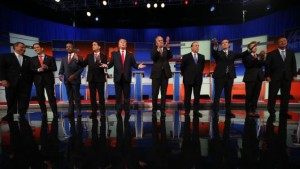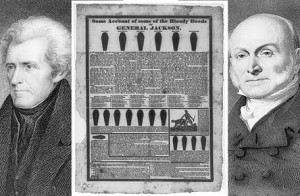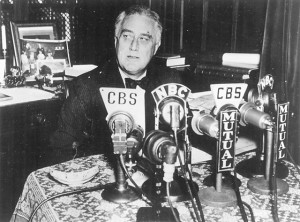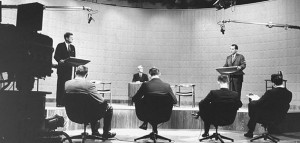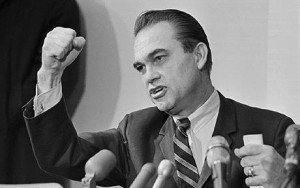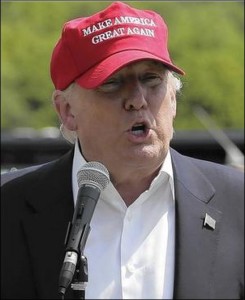Political Communication from Past to Trump
Posted: Monday, September 21, 2015, at 8:00 p.m.
by Tatum Roessler.
Presidential campaigns and elections have dominated the media for years, dating back to previous presidents and candidates like Andrew Jackson, Teddy Roosevelt, John F. Kennedy, Ronald Reagan and now Donald Trump.
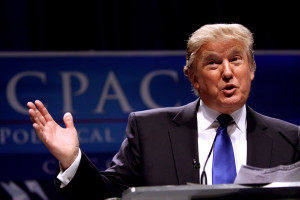 Each candidate had their own unique platform and communication style to represent their respective parties and resonate with their voters and mainstream media. In contrast to the traditional media of elections past, the candidates today face a 24/7 news cycle; and now, they have social media to directly communicate with their supporters and the public.
Each candidate had their own unique platform and communication style to represent their respective parties and resonate with their voters and mainstream media. In contrast to the traditional media of elections past, the candidates today face a 24/7 news cycle; and now, they have social media to directly communicate with their supporters and the public.
The current election brings about a new style of political messaging and communication. With 19 candidates and counting vying for the Republican nomination, it may be difficult to identify what each candidate’s ideas and values are. Trump has made it easy for voters to identify his ideas by dominating the constant news cycle on all major news networks and his own social media, and speaking his mind, sometimes making controversial comments causing even more media attention and buzz.
“People are attracted to sensationalism, and the media is attracted to sensationalism. As long as it garners attention, people will keep watching. Trump is like a train wreck. A lot of his coverage is from people waiting for the next thing that comes out of his mouth. At some point you do have to display a certain level of knowledge about what it means to be president,” said Dianne Bragg, assistant professor of journalism at The University of Alabama.
Looking back
In past elections in United States’ history, candidates used various media tactics on the campaign trail to garner votes and appeal to voters through the media.
The election of 1828 had so much press about Andrew Jackson, his personal life and his wife. Many claimed she passed away shortly after he was elected president because of the stress the media had on her life. Jackson took advantage of the press and used sensationalism with his political consultant, Martin van Buren. Upon securing the presidency, he and his cronies rode horses through The White House.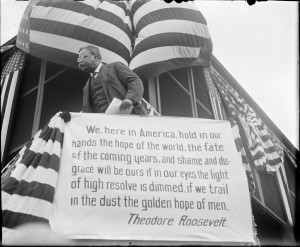
Teddy Roosevelt in 1912 turned his back on the Republican Party and his former mentee, William Taft, and formed the Progressive Party. He used grassroots campaigns and speeches to rally constituents.
FDR claimed he was not a politician and promised the American people that he would fix the economy, campaigning tirelessly through the radio and newspapers
JFK won the votes of the American people through TV in 1960. During the first televised presidential election, he faced off against Richard Nixon, who was sick with the flu and thus appeared sweaty, nervous and unprepared on camera.
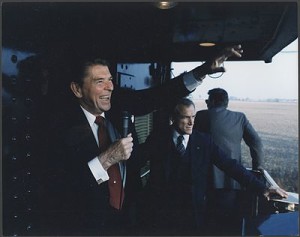 Reagan promised to fix the economy in his 1982 election and channeled the popular vote by changing political associations from his time as the Democratic governor of California to a Republican president. He also ran on the slogan and promise to “Make America Great.”
Reagan promised to fix the economy in his 1982 election and channeled the popular vote by changing political associations from his time as the Democratic governor of California to a Republican president. He also ran on the slogan and promise to “Make America Great.”
Connecting past to present
Another pivotal time in campaign history was when George Wallace, former Alabama governor, sought the Democratic nomination for president in 1968. He had comparable tactics on the campaign trail to Trump.
“George Wallace ran on a message of anger and resentment that scared and confused a lot of white people, and it was during a war that people did not understand. That created a great opportunity to understand freedom, but a lot of people had anxiety because there were changes occurring faster than ever,” said Charles Dean, political journalist for Alabama Media Group and The Birmingham News.
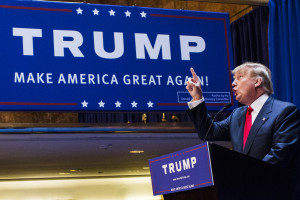 Today is not far removed from the America in which George Wallace campaigned and the audience to whom he catered.
Today is not far removed from the America in which George Wallace campaigned and the audience to whom he catered.
“And we see that now with technology advancing so quickly. I think he [Donald Trump] is capturing a mood in the country that his rhetoric is skillfully directed at. He is nothing if he is not a marketer. He is dominating the discussion in a field of others who have not found a way to punch out over his noise,” Dean explained.
We even see Trump attempting to mimic Reagan with his slogan, “Make America Great Again.”
“The Summer of Trump”
Trump is certainly individualistic in his communication style with the media and through his social media. He has posted videos on his Instagram attacking Jeb Bush, made controversial and racist remarks about immigrants, and insulted Carly Fiorina and journalist Meagan Kelly.
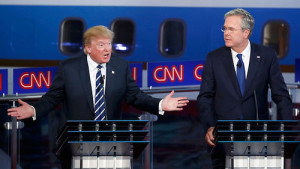 On several occasions, Trump failed to accurately address key political issues and foreign policies on conservative news networks, blaming journalists for asking what he felt were “gotcha” questions. Despite the criticism and flack he has garnered from such incidents, his numbers in numerous polls continue to rise and have made him one of the top three GOP candidates at the moment.
On several occasions, Trump failed to accurately address key political issues and foreign policies on conservative news networks, blaming journalists for asking what he felt were “gotcha” questions. Despite the criticism and flack he has garnered from such incidents, his numbers in numerous polls continue to rise and have made him one of the top three GOP candidates at the moment.
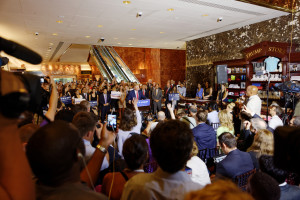 Supporters pack his rallies; his event in Mobile, Alabama, on Aug. 21 changed location three times to accommodate over 30,000 supporters. Some attendees even body painted to show their loyalty to the candidate.
Supporters pack his rallies; his event in Mobile, Alabama, on Aug. 21 changed location three times to accommodate over 30,000 supporters. Some attendees even body painted to show their loyalty to the candidate.
The 24/7 media coverage and over-the-top support of Trump even sparked the candidate to dub this summer, “The Summer of Trump.”
“In regard to Trump, you have political scientists and theorists who have studied this for years, and it really is phenomenal what he is doing,” said Ethan Stokes, Ph.D. candidate studying public relations and political communication at The University of Alabama.
@RealDonaldTrump and the future of the GOP
The question that comes into play with Trump’s controversial messaging, his constant media coverage and his dominance on social media is how this will affect the image of the Republican Party.
“My guess is that one of these guys [the 19 Republican candidates] will survive long enough to get traction. If they [the Republicans] lose the White House again to a Democrat, and they’re defeated again, a lot of hand wringing and anxiety will occur in a significant number of Republicans and voters,” said Dean.
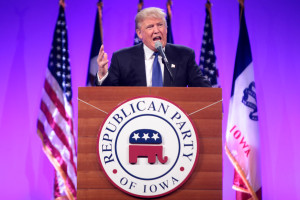 Should the Democrats defeat the Republicans for the third time in 2016, it could potentially result in a change of political communication for the party. Voters might see more candidates who imitate Trump’s political messaging.
Should the Democrats defeat the Republicans for the third time in 2016, it could potentially result in a change of political communication for the party. Voters might see more candidates who imitate Trump’s political messaging.
“[They will realize] we can’t be that brazen, and loud, and that racist/sexist; we have to understand messaging and how it’s connected. Trump’s rhetoric will impact the 2020 race in those candidates and his type of messaging will be repeated and multiplied in 2020 if the GOP loses [this election],” said Dean.
Current GOP candidates will have to strategically voice their platforms over Trump.
Many members of the media and political journalists have their own take on Trump and his affect on the presidential race. Reporter Ken Walsh for U.S. News & World Report wrote a blog recently on how other Republican candidates can take down Trump and provided several tactics from top political strategists in Washington.
“Another course would be to tackle Trump through advertising and attack videos, generated by independent political action committees or by the campaigns themselves. This could be very influential in the states with the first caucuses and primaries – Iowa, New Hampshire, South Carolina and Nevada. And this would enable Trump’s rivals and their allies to sharpen and refine their messages without a news media filter,” Walsh wrote in his blog “Taming Donald Trump.”
How to handle too many cooks in the kitchen: The media revolution
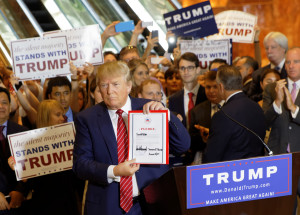 The elections and campaigns in the history of the United States are important in understanding political communication and how public relations and media come into play. PR professionals, members of the media and voters can learn from Trump and the messages he and his opponents are putting out to the media.
The elections and campaigns in the history of the United States are important in understanding political communication and how public relations and media come into play. PR professionals, members of the media and voters can learn from Trump and the messages he and his opponents are putting out to the media.
“I think it’s a revolution of the press of coverage of public events, campaigns, news. We are in a period of time where the safety guards of triggers of media have been obliterated in large parts. In most of my life [as a reporter] the media environment was very established and had rules and ethics for how one did their job and safeguards to checking information and verifying texts,” Dean said.
The important takeaway for members of the media and PR practitioners from Trump’s campaign and the 24/7 news cycle is the importance of separating fact from fiction and critically examining the validity of sources.
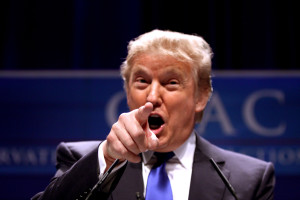 “We have so many candidates and issues that we need more time to discern [the facts]. They [the media] are losing in this haste and rush where everyone is speaking at the same time. There are many voices in the race, and they are generally good but they are all talking at the same time,” Dean noted.
“We have so many candidates and issues that we need more time to discern [the facts]. They [the media] are losing in this haste and rush where everyone is speaking at the same time. There are many voices in the race, and they are generally good but they are all talking at the same time,” Dean noted.


